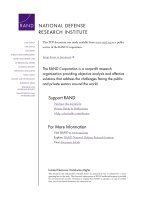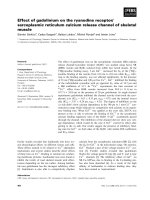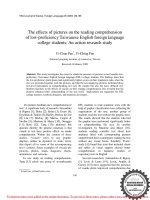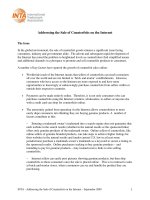evil of isolation on the scarlet letter
Bạn đang xem bản rút gọn của tài liệu. Xem và tải ngay bản đầy đủ của tài liệu tại đây (24.92 KB, 2 trang )
Evil of Isolation In the New Testament it
states that "the wages of sin is death." Though thepenalty of sin in The
Scarlet Letter is not a termination of life, the evil of isolation can bea
physically, morally, and socially tortuous event in Puritan society. Hester
Prynne andArthur Dimmesdale, in Hawthorne's The Scarlet Letter, are
both victims of the cruelisolation from Puritan society on the basis of their
sins. Hester wears her sin upon herbreast where it stands as a constant
reminder of her malfeasance. Shame and isolationstrip her of all passion
and femininity, leaving her a shell of her former self. ThoughArthur's mark
of shame is not visible, it is all the more tortuous for its absence.
Shameand guilt feed upon Arthur's soul with slow malevolency. Only a
combination of deathand confession finally release Arthur from his
torture. Though Hester's ostracism from society and the tortuous
nature of her shame,Hester is stripped of all passion and humanity. Since
society acknowledges Hester's sin,she becomes an exile in her own town.
"All the world Ha[s] frowned on her," and Hestermust bear the brunt of her
shameful isolation. When Hester walks through her town "asort of magic
circle [forms] itself around her." Devoid of any social contact, save that
ofher daughter, Hester must endure of lonely existence. "In all her
intercourse with society,save that of her daughter, there was nothing that
made [Hester] feel as if she belonged toit."; therefore, she turns to herself
for reflection of her shame. When Hester must walkthrough the town, she
suffers "an agony from every footstep." Frequent suffering does notinure
Hester to her inner torment; instead, the same grows" more sensitive with
dailytorture." Hester's ostracism from a stoic society and the burdensome
nature of her shame,deprive her off life. Treated as a dangerous
delinquent by society, Hester begins toquestion her humanity. Due to her
intense suffering, "some attribute [departs] from[Hester], which had been
essential to keep her a woman." Stripped of her passion andfemininity,
Hester is left as an iron character with a solemn manner. Hester's
shameremains to haunt her until her dying day.Reverend Dimmesdale's
bought with the evils of isolation is distinct from Hester'sdue to the fact
that his sin remains a secret from the public. Tormented by his
grievoussin and the duplicity of a fraudulent lifestyle, Dimmesdale's
physical stature is destroyed.Arthur Dimmesdale is "a man burdened with
a secret" that haunts his daily existence.The only truth that continues to
give Arthur Dimmesdale a real existence "was theanguish in his inmost
soul." Arthur wears "his hand over his heart" an indication of hisshame
eating away at his soul. In addition to the torture Dimmesdale endures
from hisshame, he constantly suffers from the fraudulent duplicity of his
lifestyle. To hiscongregation, Arthur wears a mask of purity, however,
Arthur realizes the blackness ofhis sin in private. Dimmesdale endures a
constant "bitterness and agony of heart" fromthe "contrast between what
[he] seem[s] and what [he is]" Due to his multiple lifestyles,Dimmesdale is
often "bewildered as to which may be true." The sum of
Dimmesdale'storment is manifested in the form of a "bodily disease,"
which serves to deteriorate thereverend. Dimmesdale is only able to find
peace in death and confession. Revealing hissin to society, he frees
himself to advance toward God's judgment. The evil of isolation of
Puritan society robs Hester and Dimmesdale of theirhumanity, leaving
them as stone monuments of shame. The isolation of Puritan society isa
result of their belief that "the wages of sin is death." Only in death do
Hester andDimmesdale escape the anguish that arises from isolation.
However, the infancy remainsas their "only monument" after death. The
destructive nature of shame is a powerfulweapon.









